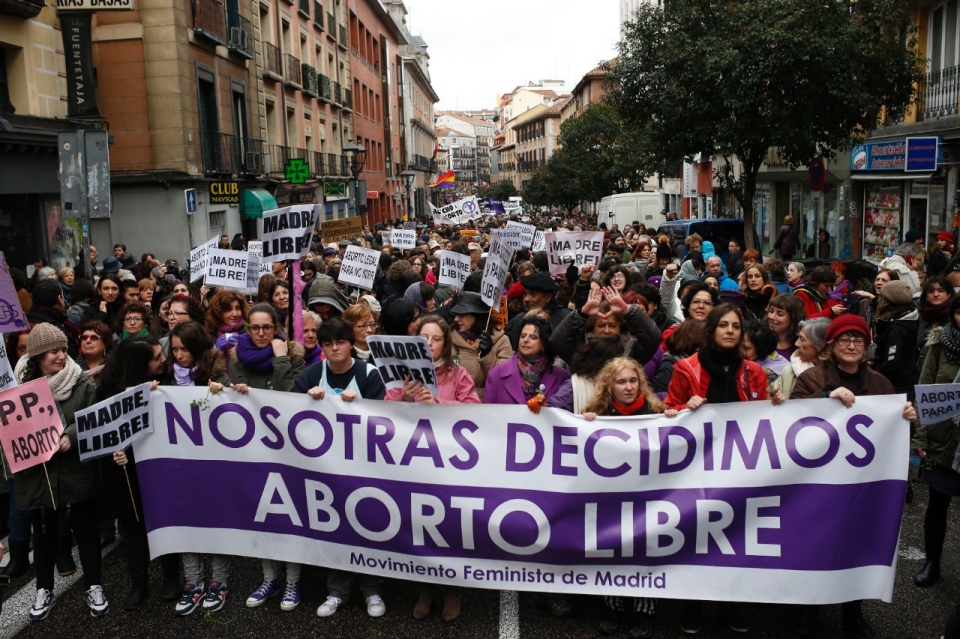
I often hear women in France wondering how it is possible that women’s access to abortion or to safe delivery is so outrageously compromised and mostly a source of revenue rather than inalienable rights in the United States. The current political landscape might help them, and us, understand.
Once again women and their bodies occupy the center stage of the presidential elections in the United States. While the last attempt to defund Planned Parenthood failed to pass, there were still too many votes in favor. The issue continues to obsess the GOP candidates and allows them to stigmatize women. They used the usual recipe to fabricate a scandal, this time targeting Planned Parenthood. They made deceptive images in order to emotionally manipulate a large portion of the population, brush aside the truth and reality, and focus on the anti women’s reproductive rights credo. The videos were assembled to manufacture false images of the use of “for-money tissues” coming from aborted embryos; ironically these accusations came from the candidates who defend profiteering at any cost. Actually, women who had had an abortion donated tissues for research on diseases such as Parkinson, Alzheimer, or orphan diseases, but does it really matter? The press was reluctant to explain the scam.
Planned Parenthood provides health care to women. One out of five have had recourse to their services because nothing exists for them in a for-profit medical system. This is not only about abortion. Across the United States, pregnant women are also mistreated: sent to prison, denied basic rights, and having no labor protection and no legally supported maternity leave.
It seems that nothing can impede the United States Republican candidates from bawling out injurious slurs toward minorities and women, while keeping silent about the reality of the violence of their economic views. But this time the farce is grotesque as well as threatening. As witnessed by the first GOP debate, the current US conservative battle for the primaries sheds light on the debacle of “democratic” debates in the cradle of neoliberal conservatism.
I asked in France what if the shocking Sarkozy or the heinous Le Pen had said something similar to launch their campaigns. Most said that this would not be accepted, not that there is no anti immigration sentiments. They said it would have triggered more mockery as well as indignation. Additionally, the response coming from the numerous associations that work on immigration rights and immigrant women’s rights would have been strong and irrefutable and accompanied with legal actions.
The question of reproductive rights is also shaped differently as deliveries and abortions are free, and pregnant women’s labor rights are still guaranteed in France as well as in many other countries, and the commitment to these rights, in France and across Europe, is robust, and again a vast range of associations is watching.
For example, when the conservative Spanish Prime Minister attempted to reduce reproductive rights in Spain, women and men from all over Europe went to the streets in support of Spanish women’s rights, thanks to these very associations, and forced the withdrawal of the bill.
However, women’s rights have been threatened in relation to the restructuring of the European Union, as we saw in Greece, Spain, Portugal, Germany, and France. This signifies another form of violence against women’s bodies, taking the oppressed body, the migrant’s body, hostage.
In the United States, the threat of these attacks against women persists in a distractive form. As Ruth Wilson Gilmore has explained, energy is going to be spent fighting each scandalous initiative while the source of the problem will be kept blurred. The debt economy that works with violence, stigmatizing women and people of color and/or lower social status, is forgotten in these debates.
Women are particularly targeted. Many women in the United States, including in my own family, have struggled during pregnancy to keep employment, to have pregnancy health particularities respected, to keep 100 % of their salary, or to pay for delivery.
Where is the outrage? Where are the images of the united colors of precarity, of women living precariously?
The neoliberal order bathes in this spectacle, and the reality of life disappears. Let’s keep in mind that the state of the status of women and women’s reproductive rights mirrors the fate of most of the population.

(Photo Credit 1: Javier Barbancho / Reuters / Landov / AlJazeera)
(Photo Credit 2: Marlon Headen of Headen Photography / RH Reality Check)
